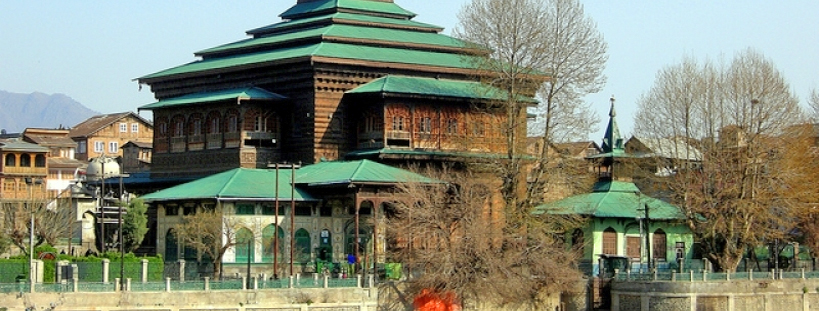
The Khanqah-e-Molla or Shah-e-Hamdan is one of the oldest Muslim shrines located on the banks of the river Jhelum in Srinagar city. An important religious destination in Srinagar, this shrine was originally built in 1395 and later reconstructed in 1732. Believed to contain "the secret of Allah" - the Khanqah-e-Molla is an excellent example of wood architecture that draws inspiration from Buddhist, Hindu and Islamic styles. Khanqah-e-Molla was originally constructed by Sultan Sikander (1389-1413 AD) in memory of Sufi saint Mir Syed Ali Hamdan, who stayed in Kashmir and was instrumental in the spread of Islam in Kashmir. Khanqah-e-Molla was ravaged by fire in 1480, and reconstructed by Sultan Hassan Shah in 1493. Again in 1731, the shrine got damaged, with Abul Barkat Khan reconstructing it in 1731.Khanqah-e-Molla, as it stands today, has a square plan, erected on irregular walled base made of materials from ancient temples. The two-storied, two-tiered structure of the shrine has gently sloping pyramidal roofs demarcating each tier. The roofs are further accentuated by heavy woodwork adorning the cornices under the eaves. The first tier features double-arcaded verandahs that run continuously around the building, and the second tier is in the form of an arcaded balcony protruding on all four sides of the main building. The pyramidal roof of the second tier is topped by an open pavilion for the muezzin, which is further crowned by a pyramidal spire. Parts of the roof have got covered with seasonal vegetation, creating a unique sight of intricate woodwork and terraced flowerbeds. The shrine of the saint at Khanqah-e-Molla lies in a cloister at the northwest corner of the structure. A date -1384 AD, marking the saint's death, is carved above the doorway. History The Khanqah Shah Hamadan Mosque:-The Khanqah mosque, known as the Shah Hamdan Masjid, sits on the right bank of the river Jhelum between the third and fourth bridges. It was built in 1395 by Shah Sikandar to commemorate the visit of Mir Sayyid Ali Hamdani, better known as Shah Hamdan. Fire claimed the mosque several times in the following centuries and the current structure, as seen today (except for the more recent cloisters), was sponsored by Abul Barkat Khan in 1732. It now stands 38 meters tall. Khanqah of Shah Hamdan, popularly known as Shah-i-Hamdan Mosque, is also called as Khanqah-e-Molla. This shrine has been built along the Jhelum River by Sultan Sikander in 1400. He constructed this shrine in honour of Mir Syed Ali Hamdani, who popularised Islam in the state of Jammu and Kashmir. Special Feature: It is the first ever mosque to be constructed in the Kashmir valley. Nuisance: Calm and peaceful. Dressing Restrictions: Conservative-no revealing tops and shorts or short skirts. Connectivity: Easily accessible by buses or taxis. Best Time To Visit: April- June and September-October when weather remain very pleasant. Visit Restriction: Non-Muslims are not allowed inside the mosque whatsoever. Suggestion: Follow the religious code of conduct of the mosque.
© Bonjour Media. All Rights Reserved.